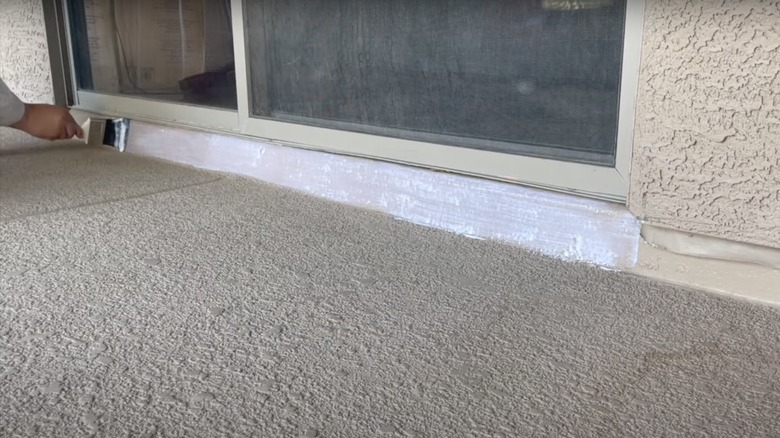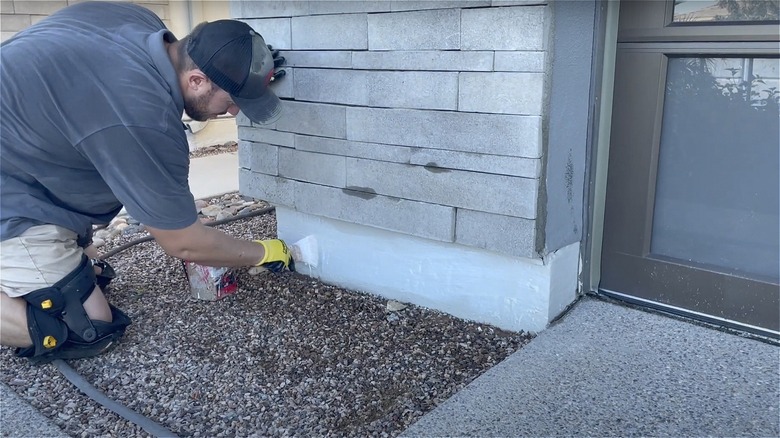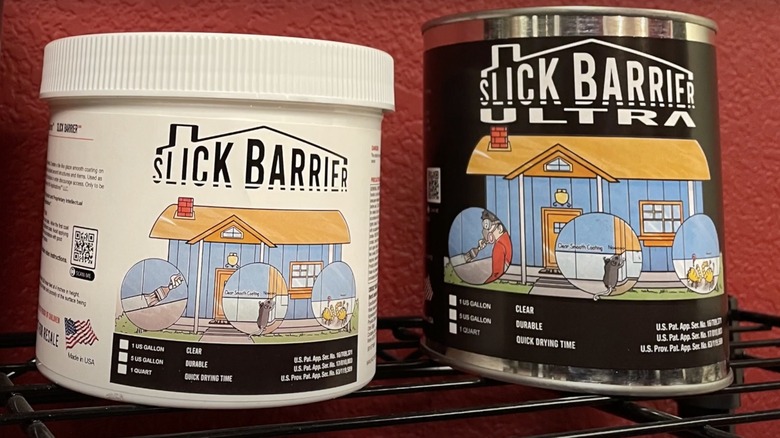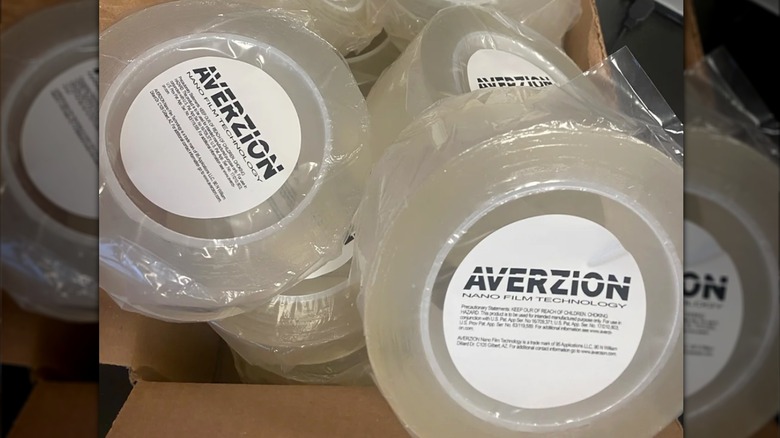Whatever Happened To Slick Barrier After Shark Tank Season 14?
We may receive a commission on purchases made from links.
While there are always game-changing, revolutionary new products being featured on "Shark Tank," if you're trying to keep insects out of your house, Slick Barrier probably caught your eye in Season 14, Episode 13. Pitching their patented product Slick Barrier to the Sharks, Tony and Aaron Gonzales cited a need in the market for a safe and effective solution for homeowners looking to keep scorpions, insects, and other potentially dangerous pests out of homes once and for all.
Slick Barrier is a paint-like substance that goes on white and dries clear, creating a hard, smooth, slippery surface at the base of your home's exterior. Insects and other pests are unable to climb this slippery barrier, preventing them from gaining access to your home. Slick Barrier is non-toxic, pesticide free, and acts as a physical barrier of protection rather than a chemical one, making it safe to use around your pets and family.
Aaron first got the idea for Slick Barrier in 2013 when he discovered that the house he and his family had just bought was infested with venomous scorpions. The concept of Slick Barrier came to him after realizing that the captured scorpions were unable to climb up the side of a slippery glass jar. Several weeks after getting stung himself, the four year old son of Aaron's good friend Tony was also stung by a venomous scorpion, nearly losing his life. With that, the duo banded together to come up with a solution and created Slick Barrier.
How did Slick Barrier fare on Shark Tank?
Together, Aaron and Tony Gonzales entered the shark tank asking for an investment of $500,000 for 10% equity in their company, putting their implied valuation of Slick Barrier at $5 million. During their presentation to the Sharks, Tony and Aaron presented Kevin O'Leary with a container full of cockroaches and scorpions — the exact kind that infested Aaron's house years prior. When faced with the obstacle of bricks painted with Slick Barrier, they were unable to escape their containment. To vouch for the effectiveness of their product even further, the duo explained that Texas A&M and Mexico State University held independent studies of their product and both found it to be 100% effective.
In addition to the product itself, the company also offers an installation service in a few states, and this service costs around $1,400. After being pressed for sales and profit information, the pair revealed that they grossed $180,000 in sales in 2020, while generating roughly $650,000 in revenue during 2021. As for 2022, they shared that they were making roughly $50,000 per month.
After the rest of the Sharks backed out, instead of accepting their exact asking value, Lori Greiner decided to make an offer to the pair of $500,000 for a higher equity of 15%, contingent on $400,000 of that being a loan that she expected to be paid back. Ultimately, the duo accepted Greiner's offer after not receiving competing offers from the other Sharks.
Slick Barrier after Shark Tank
Tony and Aaron Gonzales are both grateful to have gotten an offer from a Shark and are glad they took the opportunity to make their pitch on the popular show. Their television debut helped broaden their reach by allowing them to simultaneously make their pitch to everyone at home and introduce those in need of pest control to their product. "The 'Shark Tank' experience was in one word, 'intense,'" Tony said via Daily Independent. "Not only were we battling the Sharks, but we did it demonstrating our product. It was an amazing experience."
The airing of their episode and the success of their pitch in garnering the interest from a big name investor helped Slick Barrier reach newfound levels of notoriety and success. In the week following the airing of their episode, Slick Barrier did $100,000 in sales. With the help of Lori Greiner, Tony and Aaron's business has grown exponentially.
Is Slick Barrier still in business?
Slick Barrier is still considered to be a "Shark Tank" success story, as the company is still actively operating and making money from its revolutionary product by selling it online to both professional pest control companies and homeowners. You can order a kit of Slick Barrier directly from the company's official website, and these kits are sold in three different sizes. Each kit comes with a can of Slick Barrier and a Can of Slick Barrier Ultra, which is an additional clear solvent-based product that goes over top of the water-based product for maximum effectiveness.
The ultra small kit costs $149 and covers approximately 200 linear feet, whereas the ultra large size runs for $279 and will cover roughly 400 linear feet. The ultra extra large size is $389 and covers 800 linear feet. They also sell a gallon of the traditional product for $149.99, which is intended for rodents and other large pests as opposed to insects.
What's next for Slick Barrier?
Recently, Slick Barrier has expanded its product line to include Averzion with nano film technology, which goes on as an adhesive tape rather than a paint, though it is intended to work similarly to the original product. The Nano Film is sold in both 35 and 100 feet lengths for $49 and $79 each, respectively. Slick Barrier hopes to expand its client base and list of product offerings in the coming years. In addition to its list of available products, Slick Barrier also offers professional installation services of its product in the states of Arizona, Nevada, and Texas, with hopes to expand the availability of that service in the future.
To date, Slick Barrier has professionally installed the product in over 6,000 homes across the U.S. and has secured partnerships with some of the largest, most reputable pest control companies. In addition to selling directly on their website and Amazon, the founders hope to have their product line available in several major retailers. So far, they have succeeded in making their way onto the shelves of The Home Depot, with availability at 186 locations in Arizona and Texas. The company is still actively seeking investment opportunities on its website, citing the potential for growth and hopes to continue expanding its reach.



